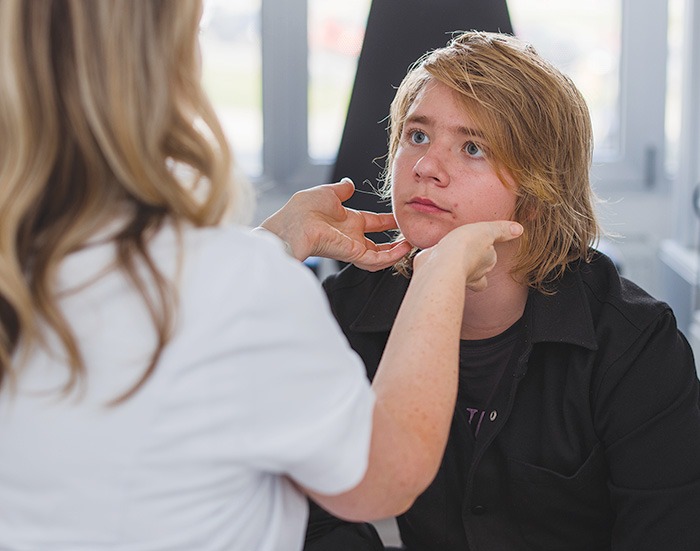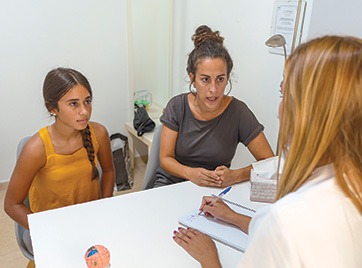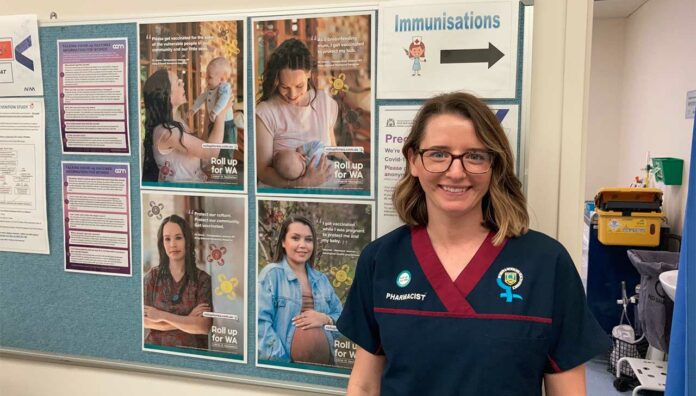Outbreaks of COVID-19 in maternity wards and neonatal units show the threat it can pose to newborns and their families. Australian Pharmacist spoke with one pharmacist working to ensure expectant mothers protect themselves and their babies through vaccination.
Today, it was announced that a newborn in the neonatal intensive care unit (ICU) of Canberra’s Centenary Hospital for Women and Children was infected with COVID-19.
Last week, a COVID-19 outbreak spread through the maternity ward and neonatal ICU at Newcastle’s John Hunter Hospital. Of the 6 known infected parents, 3 are unvaccinated, 2 are partially vaccinated, and the vaccine status of the other is unknown.
Parents listed as close contacts and the family members of exposed babies were placed in isolation, unable to visit their newborns.
Dr Nisha Khot from the Royal Australian and New Zealand College of Obstetrics and Gynaecology (RANZCOG) told the ABC events like this will become more common due to ongoing community transmission of COVID-19, and should serve as a ‘red flag’ for pregnant women to get vaccinated.
‘Most women want to do the best thing for themselves and their babies and they might think doing nothing is best,’ she said. ‘But in this situation it’s not the right thing to do.’
Pregnant women who get COVID-19 are more likely to suffer severe illness and require treatment in intensive care. They also have a higher risk of premature birth and stillbirth.
A recent retrospective study by the Journal of the American Medical Association, however, shows that vaccination significantly reduces the chance of pregnant women catching COVID-19.
Both the RANZCOG and Australian Technical Advisory Group on Immunisation (ATAGI) recommend that pregnant women are routinely offered mRNA vaccines at any stage of pregnancy. COVID-19 vaccination may also provide indirect protection to babies by transferring antibodies through the placenta (for pregnant women) or through breastmilk (for breastfeeding women), according to RANZCOG.
Pharmacist leading the charge
To protect pregnant women and their unborn babies from the severe adverse outcomes associated with the virus, Western Australia’s King Edward Memorial Hospital opened a COVID-19 vaccination clinic for pregnant women opened on 20 September.
Hospital pharmacist and COVID-19 vaccine coordinator Sarah Woodland explained that the clinic runs via opportunistic referrals.
‘When [patients] attend the antenatal clinic, we have immunisation midwives and obstetricians available to have discussions with them if they have any concerns [about vaccination],’ Ms Woodland told AP.
‘We can talk about the safety of COVID-19 vaccines in pregnancy, breastfeeding and [impacts on] fertility.’
When familiar health professionals provide this information to patients in a safe space, it can reassure them about the process.
‘Then we have the vaccination clinic available, with very minimal wait time,’ Ms Woodland said.
While the clinic’s primary focus is antenatal patients and their support people, King Edward’s Breastfeeding Centre also refers women for vaccination.
‘We have lactation consultants involved in the referral process, and there are some pregnant patients who are breastfeeding other children as well,’ she said.
‘Essentially, we’ve made the clinic available to any outpatient, whether they be pregnant, breastfeeding or a gynaecological patient.’
Clinic set up
For now, there is one vaccinator delivering the service – an immunisation midwife who was already responsible for offering the influenza and pertussis vaccines to pregnant women.
Another midwife, set up in the waiting room, offers the COVID-19 vaccine to patients, and discusses vaccine safety and the recommendations in pregnancy.
As a pharmacist, Ms Woodland forms the backbone of the clinic.
‘I assist with the preparation of the vaccine, manage the stock control and the reporting, and provide support to the midwives should they have any further questions or referral points,’ she said.
This includes inquiries about any potential medicine interactions.
Recently a midwife queried whether a patient who needed an Rho(D) immune globulin injection could have her COVID-19 vaccine on the same day.
‘I was able to provide the information that yes, they certainly can,’ Ms Woodland said.
‘The only thing we recommend is that other vaccines, like the flu or whooping cough, are [given] at least 7 days apart from the COVID-19 vaccine.’
Pharmacists best for the job
Approaching a delicate issue like the COVID-19 vaccine in pregnancy is fitting for pharmacists, Ms Woodland said, because they are the ‘champions of evidence-based information’.
‘We’re experts in the [quality use of] medicines and medicine safety, so we can provide that information quite readily and easily to patients,’ she said.
Ms Woodland uses a COVID-19 database to provide information to midwives and patients, populated with up-to-date information that the pharmacist-run obstetric medicine information service provides.
‘We spent a lot of time curating COVID-19 specific information about the safety [of vaccines] in fertility, pregnancy and breastfeeding,’ Ms Woodland said.
‘So we’re able to offer those resources and give additional information on top of what is already available on government, the ATAGI and RANZCOG websites.’
Combatting hesitancy
While the clinic is just getting started, Ms Woodland said almost 100 patients come through per week for their COVID-19 vaccine.
‘There is still a fair amount of hesitancy in the pregnant population,’ she said, ‘but uptake is slowly improving.’
Ms Woodland cited a recent example of a patient and partner who were worried about receiving the vaccine, and wanted to postpone the process until after birth.
‘So we had a discussion about [why] mRNA vaccines are recommended in pregnancy and that antibodies produced from vaccination cross the placenta and may provide protection to the fetus,’ she said. ‘Having a vaccinated partner also means there’s more protection for the family.’
If there is a COVID-19 outbreak in WA, Ms Woodland highlighted this may prevent the partner from visiting mother and baby in the hospital if they are unvaccinated.
In the end, both the patient and her partner decided to get vaccinated.
Getting the message across can be tricky at times, however, as COVID-19 does not present an immediate threat in WA.
‘But I try to put out the message about being proactive and passing on antibodies to the baby in utero before an outbreak,’ Ms Woodland said.
‘Now is the perfect time to get it done while the clinic is readily available for them without a wait time.’
Tips for community pharmacists
Good resources are the key to reaching vaccine hesitant pregnant women. Ms Woodland recommends MotherToBaby, a free, peer-reviewed source with up-to-date information on the safety of COVID-19 vaccines in pregnant and breastfeeding women.
Pharmacists can also get in touch with their jurisdiction’s obstetric medicine information services (state-specific contacts are available here), as well as check the ATAGI and RANZCOG websites for recent updates.
‘It’s certainly not about forcing the vaccine on anyone, but letting them know that being proactive rather than reactive is a really good way to maintain your health,’ she said.
‘And [emphasising] that we have a lot of safety data and the government bodies behind us to support the use of mRNA vaccines in pregnancy and breastfeeding.’



 Pharmacists have always prescribed, but they have the potential to prescribe much more
Pharmacists have always prescribed, but they have the potential to prescribe much more



 Sponsorship information
Sponsorship information


 Talking to patients who have questions
Talking to patients who have questions





